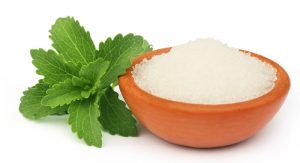The Best Artificial Sweetener for Diabetics
Although quitting refined sugars can be quite tough, it is definitely worth all the effort considering how incredibly damaging sugar can be especially for diabetics. Luckily, there are some artificial sweeteners that are actually great for your health. Besides tasting very sweet, they are low in fructose and low in calories. You will find artificial Sweeteners in many things – Desserts, yogurt, diet soda’s, breakfast cereals, snack bars and a myriad of other foods. In order to choose the best artificial sweetener for diabetics, it is essential to learn more about the properties and effects of these healthy artificial sweeteners:
-
Stevia – Can Diabetics Use Stevia?
Most certainly they can!
Steviol is a popular low calorie sweetener that is extracted from a plant in South America known as Stevia rebaudiana. It has been for many many years in South America, as a sweetener and best of all, contains virtually no kilojoules! Stevia leaves contain numerous sweet compounds including Rebaudioside and stevioside.
These sweet compounds are about 300 times sweeter than regular sugar. It is often sold as a powdered extract in most food stores. Moreover, stevia has been used for centuries by various native Indian communities especially in Paraguay.
What are the Health Benefits of Stevia?

- Stevia can help lower high blood pressure by 6 to 14%. It has been shown to lower the level of blood sugar in diabetics.
- It has been tested numerous times around the globe and found to be non-toxic.
- Stevia can be incorporated in the diet of diabetics because it does not raise the blood sugar levels.
- Both stevioside and stevia extracts can be used in cooking and baking because they are extremely heat-soluble.
Some studies show that stevia can also reduce oxidized LDL cholesterol, reduce the build-up of plaque in the aryeries and improve insulin sensitivity.
-
Erythritol
Erythritol is a low-calorie sugar alcohol that contains 6 percent of the calories or 0.24 calories per gram as sugar with about 70 percent of the sweetness. It does not have any effect on biomarkers such as triglycerides or cholesterol because it does not spike insulin or blood sugar levels. The body absorbs erythritol from the intestines but it’s eventually excreted unchanged from the kidneys. Although studies show that it is very safe, just like other sugar alcohols, consuming erithritol in high doses at a time can cause digestive issues.
-
Xylitol
This sugar alcohol has sweetness very similar to sugar. Xylitol contains about two thirds the calorific value of sugar or about 2.4 calories per gram. It helps prevent osteoporosis by improving bone density. It is also great for diabetics because it does not raise insulin or blood sugar levels. Xylitol offers some dental health benefits such as preventing dental decay and cavities. However, xylitol is toxic to dogs and should be kept safely away from them. It can also cause digestive problems in high doses.
-
Acesulfame-K (Also known as Ace-K)
Acesulfame-K is a tabletop sweetener that is commonly used as an additive to alcoholic drinks, pudding, and confectionery. It’s sweetness level is about 200 times that of sugar.
Benefits of using Acesulfame-K

- There are no health or safety concerns associated with its use.
- It can also be used in baking and cooking
- Acesulfame-K is safe for use even during pregnancy.
- It does not affect blood sugar levels
What are the Disadvantages of using Acesulfame-K?
- When used on its own, Acesulfame-K can leave a sour or bitter taste in your mouth.
There are also some popular health conscious sweeteners you can use instead of sugar. These include maple syrup, honey, molasses and coconut sugar. This in-depth analysis will help you choose the best artificial sweetener for diabetics depending on your needs and preferences and help control your sugar levels.
Here’s to Controlling your Diabetes!
